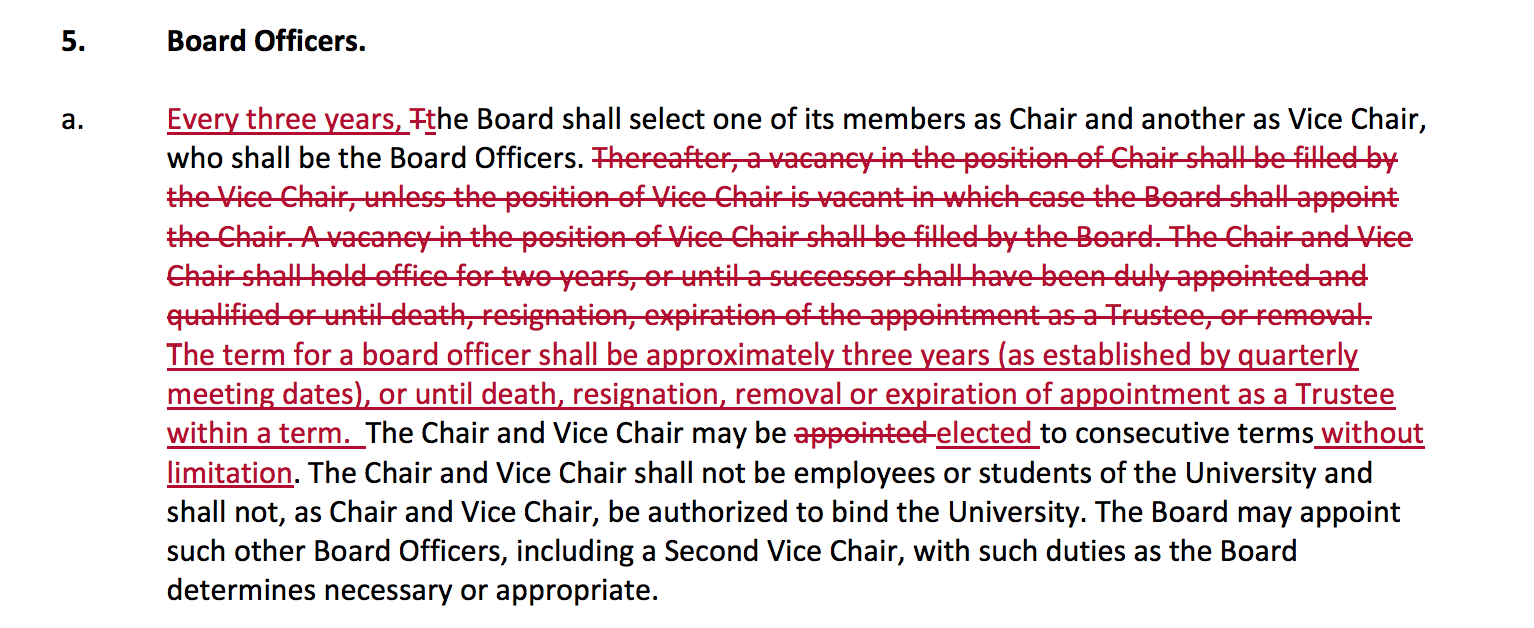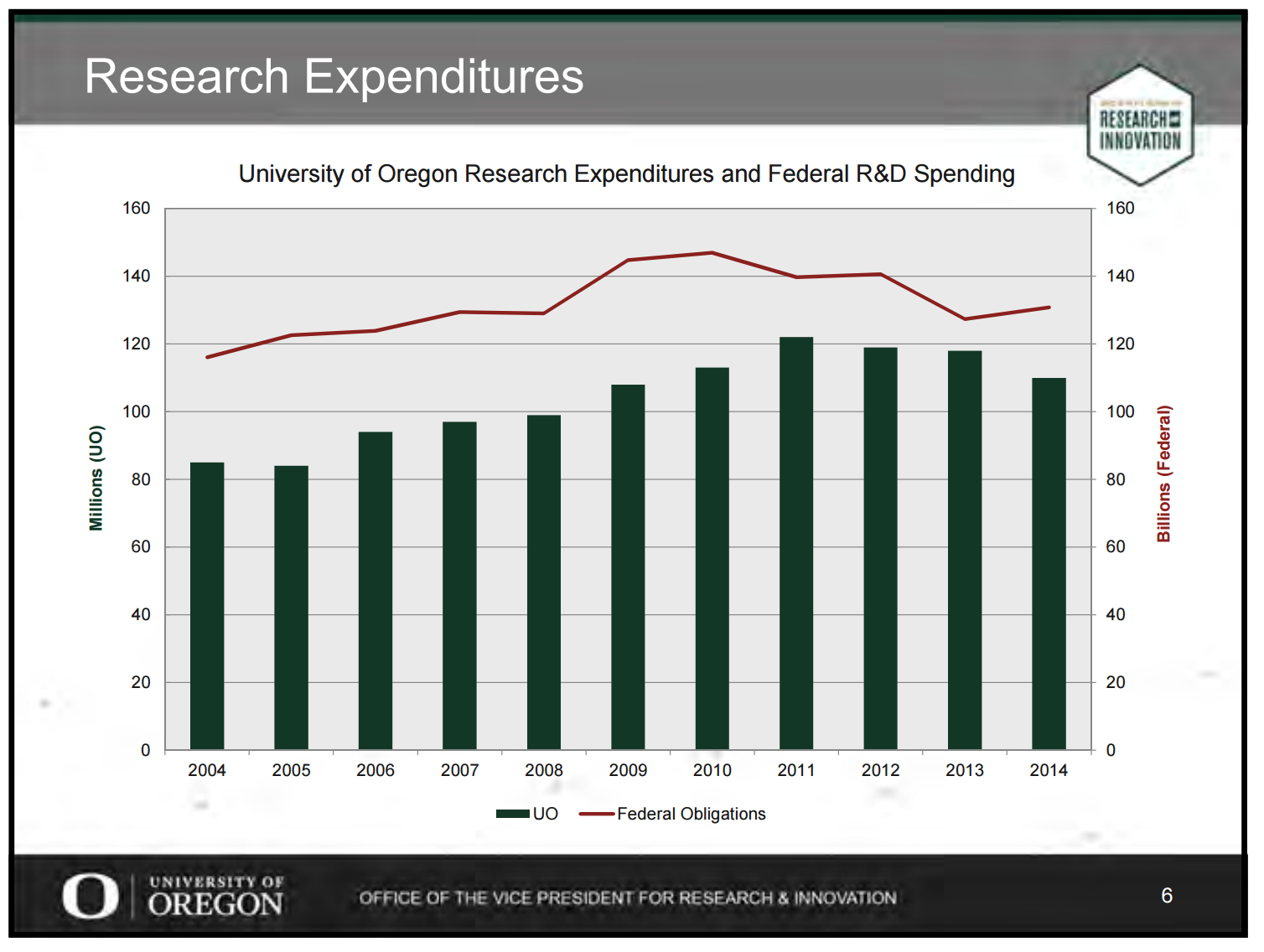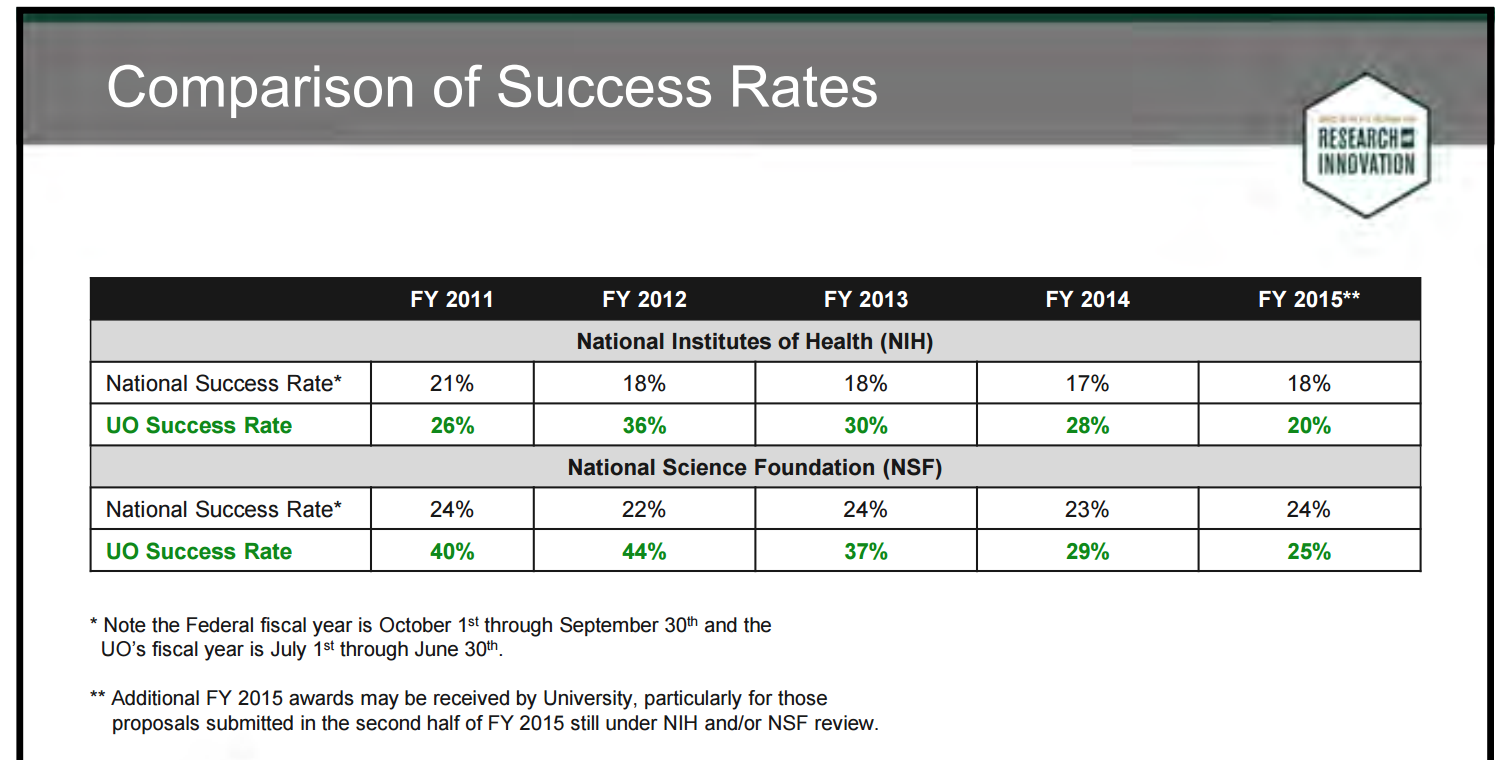The September 10th live-blog is here. Live-video feed here. Noah McGraw’s ODE live-blog is here. Board docket is here.
Summary of the Th and Fr board meetings:
The good: The board is obviously very happy with President Schill, as they should be. There were no sneak attacks on faculty governance (except a minor glitch with the student conduct code, which the board took off the agenda when they realized it was an issue). Governor Brown showed up and seemed very supportive of the Board and their efforts and desire to maintain independence.
The bad: The state gave UO independence because of promises that this would bring in private support for research and for teaching Oregon students. Some of that happened last year with Connie Ballmer’s gifts. But at this meeting all the news was about still more money for the Ducks: the Mariota complex, and the Hayward field tart-up (which will include some space for human phys research.) In contrast, the board had no announcements about new private money to support UO’s academic mission.
Ironically it was the state, not the board, that came through for academics, with $19M in new general fund money and the potential for more, as well as bond money to build and renovate three buildings (matched with some private gifts but with more needed to hit the targets). Three academic buildings. The state also paid for the Straub renovation and new space.
The weird: Lots of time was spent on changes to the board’s bylaws designed to keep trustees following the party line, and giving Lillis another year as Chair without having to run for chair. I don’t see any reason for either of these changes. Maybe they were just about him demonstrating he’s in control of the board and won’t tolerate dissent.
FRIDAY, SEPTEMBER 11, 2015 PUBLIC MEETING – FORD ALUMNI CENTER, GIUSTINA BALLROOM
Usual live-blog disclaimer: My opinion of what people said, meant to say, should have said, or were really thinking when they were saying something else. Nothing is a quote unless in quotes, and given that Board Secretary Angela Wilhelms has stopped providing coffee to the visitors, while making us watch the trustees eat what looks from here to be a Full English, which she probably paid for with our students’ tuition money, you can expect this live-blog to be a bit more testy than usual. In other words, coffee for everyone would be a Pareto improvement, OK?
9:00 am – Meeting Re‐Convenes – Call to order, roll call, verification of quorum
8. State Priorities in Higher Education: Governor Kate Brown
Governor Kate Brown will discuss her vision for higher education in Oregon with trustees.
This should be interesting. Here’s the video of Governor Brown delivering a promise of $30M in state funds. But it’s not for higher education, it’s a promise to the notoriously corrupt IAAF, for a track meet:
The Diane Dietz story in the RG is here. UO is still refusing to release the public records. What happens in Doha stays in Doha? I doubt it. The Manchester Guardian report on how Eugene won the 2021 bid is here. More from the Guardian on new IAAF Chairman Sebastian Coe’s ethical issues here.
It’s silly to think the records on this can be kept hidden for long. Thanks to an anonymous professor for forwarding this standard public relations advice:
1) Acknowledge the problem (i.e. admit fault)
2) Appoint CEO as the spokesperson
3) Over-correct.
Governor Brown: Praises UO’s Pathways Oregon program for low income Oregon students. Add-on to Pell grants that covers full tuition, but not living costs. Happy to have ended a long period of state disinvestment. 19% year over year increase UO, and an expansion in the Oregon Opportunity Grant. Also invested in UO’s path to research excellence. Pleased with collaboration between UO and TRUs.
Brown and Lillis have some well scripted Q&A:
On UO’s opportunities and challenges: Lillis: Members have little higher-ed experience, steep learning curve. Everyone was suspicious of our motives.
Brown: Could HECC help? Lillis: We want to stay independent. HECC is a balancing act, if their role is to facilitate cooperation, good. But we don’t want any regulation.
Brown: HECC coordinates, boards govern.
Susan Gary: Decision was made to put faculty on the board (her) and I think this has been helpful. [Gary was picked by her law school colleague Margie Paris, not by the faculty. She has limited support, has kept faculty out of the loop, left for sabbatical in the middle of her term as trustee, and the UO Senate has already voted, unanimously, for a process make sure the next faculty appointment is done transparently and with full faculty participation.]
Ralph: What does student success mean, given wide variation in student ability. Brown: I also am concerned about this, uses her son as an example. Didn’t finish college, works for FS. Student need different sorts of education.
Schill: Thank you for the state’s support for UO. When I was deciding to take this job, some people told me they didn’t think Oregon wanted a world class university. All the people in this room want this. What are your aspirations for UO? Brown: Yes, look forward to partnering with you. Oregon needs you.
Kurt Willcox: When boards were created people worried if we would stay public. Heartened state has provided more funding, but it’s still a small percentage. Do you have plans to increase public funding? Brown: I’m concerned about access for Oregon students. Wants to provide more support, will work with business and the labor community to increase taxes.
Lillis: Do you have any suggestions for us as a new board? Brown: Help kids from Coos Bay get a good education and then go back to Coos Bay to help it thrive. Do a better job training k-12 teachers. [Needless to say, this is not what a top-tier research institution wants to hear].
Peter Bragdon: What do the 5 year trends in reinvestment look like? Brown: I wish I were an economist. Good blue-collar jobs are gone, we need to invest in higher-ed (and community colleges). Need to make it affordable. On revenue, things look stable – for now.
Curry: What do you see as Oregon’s growth industries? Brown: We want to “grow our own”, so to speak. Help existing Oregon business. Can we steal business from other states? More sports retail businesses – tells trustees to read “Men of Oregon”. Schill: I’ve got 5 copies. Brown: Advanced manufacturing, e.g. Precision Castparts.
Lillis: What do you think about Oregon’s pathetic HS graduation rate? Brown: We’re putting money into this, e.g. full-day kindergarten.
Brown: How can the state best support you? Keep up conversation.
Break for photo-op.
9. Resolutions from Committee
9.1 Executive and Audit Committee Referrals
‐‐Referrals: Internal board policies (2) (pending September 10 committee action)
Lillis: Do we have the revised text? Wilhelm: We emailed it.
[These revisions are basically an effort to slap down Ginevra Ralph, Ann Curry, Kurt Wilcox, Helena Schlegel, (and the faculty trustee, if we ever get a good one) in line. It seems pretty petty.]
Board approves these changes.
Second resolution is to allow Lillis to be chair for another year without an election.
If I read the current bylaws correctly the board should have an election for chair at this meeting. Instead, they are going to vote for a change in the bylaws that would automatically give Chuck Lillis, the current chair, another year in office. Normally a change in terms would take effect after the current office holder’s term expires, but I don’t see any such qualifier here:
Pretty tough to vote against this with Lillis calling the vote and looking people in the eye, and it’s predictably unanimous.
9.2 Academic and Student Affairs Committee Seconded Motions
‐‐Seconded Motion: Policy repeal and technical conduct code amendment (pending September 10
committee action)
Faculty Trustee Susan Gary provided no advance warning of this motion, which had not gone through normal University processes nor been shared with relevant faculty. John Bonine (Law) managed to persuade the board to drop it until he and the Senate Executive have a chance to review it.
9.3 Finance and Facilities Committee Report and Seconded Motions
‐‐ Seconded Motion: AY15‐16 budget (pending September 10 committee action)
‐‐ Seconded Motions: Capital project agreements (2) (pending September 10 committee action)
‐‐ Seconded Motion: Academic building capital projects (pending September 10 committee action)
‐‐ Seconded Motion: Earlier student input in tuition process (pending September 10 committee action)
Wilcox: Process questions – given accelerated schedule, members don’t have time to digest committee reports before voting. We get them by email, at night and then vote in the AM. This is not a good process.
Curry: Agrees, suggests committee chairs should report before full board votes.
Schlegel: Are you sure the Mariota plan will have no impact on the academic budget?
Moffitt: Athletics will be responsible for operating costs. That won’t affect the general fund, because they are self-supported. [Sure they are Jamie. You know better than this. See here for overhead. And this is exactly how we got screwed on the Jock Box budget. And the pressure on the athletics budget means it will be even longer – as in never – before the Ducks start paying something back to UO.]
Board approves motions, with no serious informed debate in either committee or by the full board. Amazing.
10. Sponsored Activities Presentation and Discussion
Vice President for Research and Innovation Brad Shelton, AVP for Research and Innovation Cass
Moseley, and Professor Karen Guillemin will engage trustees in a high level discussion about
sponsored research at the UO.
Page 131 of docket, here.
Shelton: Our federal support is roughly in line with total federal support, lagged a bit. Federal support is crucial to staying in the AAU. Sorry, but sports product design research money from industry is not going to help us stay in the AAU.
Lillis: Isn’t industry money as good as federal money? Shelton: No. Not peer reviewed, not basic research, not aimed at the public good.
Still gotta update this one – the Duck budget is now ~$105M:

Shelton: Basic research is very expensive. For space, we’ve already outgrown the LISB that Lorry Lokey paid for a few years ago. Equipment is expensive. We cobble the money together from various sources including philanthropy. We need a new DNA sequencer – $750K.
Lillis: Is it true that even federal grant money needs private support? Shelton: Yes. We always lose money on research.
Research is very competitive. Funding is flat, number of submitted proposal is soaring, UO success rates are relatively good:
Curry and Ralph: If research always loses money, where do we make it up? Shelton: E&G fund, usually.
Shelton: Explains F&A/ICC basics. UO’s is now just 45%, we are (still) trying to negotiate it higher. Why so low? We don’t have enough private research support.
Brad is doing a good job explaining the nuts and bolts of research to the trustees. Really getting into the weeds, which is good. Sorry I’m not blogging it all.
Susan Gary speaks. [You know, if we’re trying to emphasize research, maybe we should have a faculty member on the board who is a PI, instead of a law school prof?]
Board adjourns, followed by exec session.
Lillis gives Kurt Wilcox the floor, since as an SEIU member he’ll be out of the exec meeting.
Wilcox: Glad there’s been a settlement, it’s a good one, expects members will support it. Calls for the board to try and make a new beginning with the classified staff, who are dedicated to the university and the students. However they feel the institution does not respect them, and this feeling is reinforced every two years when the administration’s bargaining teams start with aggressive takeaways. Not hard bargaining, it’s disrespect, as Dorothy Attneave explained so well yesterday.
12:15 pm – Executive Session
11. Update on current collective bargaining
This session is closed to the public and the media pursuant to ORS 192.660(2)(d) and 192.660(4).
Lunch will be provided for trustees and required participants.
Meeting Adjourned



There seems to be less discussion and more top down bossing from Lillis. Curiously, no public comments about Hayward Field and “the tart up” — perfect project name, btw. There is an obvious reason he wants one more year (and then another?) and this seems to be a most likely candidate. The Board gets bottled up in unanimous voting, but silence speaks volumes.
One reason for the lack of public comment may be that plans for yet another Knightly Football Palais were not announced much ahead of the board’s voting–and in tandem with Labor Day weekend, as well as during a time when there remain several weeks before the start of the regular Fall term. Not that our picketing or weeping would have made a difference. But it did seem all rather hush-hush, hurried, and forced. And it is depressing, now that the dust has settled, that the only capital projects the Board has funded of their own initiative are the sporty ones. Sad. And embarrassing for Lillis–at the very time he seems to be silencing and overriding those board members who might go another direction.
Could this be they are trying to get both the state and the Knights to commit to the Larieviere plan to build up our endowment by $1B?
Personally I’m excited to see what we can get done with a competent president with a track history of make his institutions better. Asking the state do they really want a world class research university if important and vital. Building better facilities can be good, but really we need get top talent and the way to do that is $$$$.
You have to be careful interpreting the “funding success rate” because it should be normalized by total dollars involved. For instance, I may have a reasonable funding “success” rate for relatively small dollar amounts like 100K per year – but my attempts at the 500K per year grants have been mostly unsuccessful.